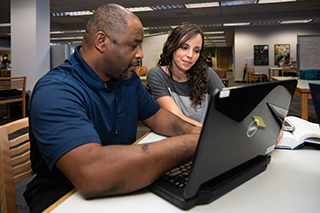Undergraduate Major
Why History?
The History Department produces an informed citizenry in a rapidly changing society by giving its students the tools and skills to analyze and understand the world around them. Historians are investigators, experts at collecting, piecing together and examining evidence, but they are also storytellers, weaving together past lives and events into complex narratives.
As History majors, students will be exposed to the momentous sweep of our collective past and encouraged to seek out connections to our present. They will learn to think with rigor, communicate with clarity and analyze difficult problems. The study of History gives students a foundation of marketable skills from research to writing to collaboration that provide excellent preparation for professional careers in a wide variety of fields.
What can you do with a degree IN History?
Students of history frequently pursue:
- occupations in business, government, law, education, finance and international affairs
- diverse fields from wealth management and banking to museum curation, tech consultancy and public relations
- admission to the best law, business and graduate schools in the country
In addition to these opportunities, many students go on to pursue master's or doctoral degrees to conduct research and teach at the college level. Others enter the workforce immediately after receiving a B.A. degree, bringing the skills they gain as history majors into a range of careers.
DEGREE OPTIONS
The College of Arts and Sciences offers a B.A. in History on the St. Petersburg campus.
View more information about options on the USF Tampa and Sarasota-Manatee campuses.
History AT USF ST. PETERSBURG

The History bachelor’s degree is structured around a flexible curriculum with emphasis on student choice, civic engagement and interdisciplinary approaches. Whether you are a traditional or transfer student, the History curriculum allows students to complete their degree requirements efficiently, while choosing the elective coursework that best aligns with historical interests and professional goals.
Faculty on the St. Petersburg campus teach courses on a variety of historical periods, but with particular expertise in:
- the history of early Florida and transatlantic history;
- African history and the comparative history of empires;
- the U.S. Civil War, Reconstruction and environmental history; and
- the history of early modern Europe, the Enlightenment and the French Revolution.
Thematic and comparative history courses bring together examples across time and place, encouraging students to think critically and imaginatively about the past. Students also have the unique opportunity to take part in a two-semester Spanish Paleography program, with opportunities to conduct archival research in Spain.
The St. Petersburg campus houses La Florida: The Interactive Digital Archive of the Americas, which brings to life the critical events of America’s earliest beginnings and the diverse melting pot of people who made up Spanish Florida. The city of St. Petersburg is also home to a number of educational, cultural and public policy institutions that provide internships for history students, including the St. Petersburg Museum of History, the Florida Holocaust Museum, Heritage Village and the League of Women Voters.
REQUIREMENTS FOR THE MAJOR IN History
Always refer to the Undergraduate Catalog for degree requirements. Students are encouraged to take HIS 3002, Historical Methods and Materials, early in their history course work at USF, as this course helps them to establish the analytic skills, habits, and knowledge needed in subsequent courses. Students are also urged to consult with history faculty and the history advisor to design an appropriate course of study and to ensure that all requirements for the major are fulfilled.
QUESTIONS?
For questions about this program, contact an Academic Advisor.